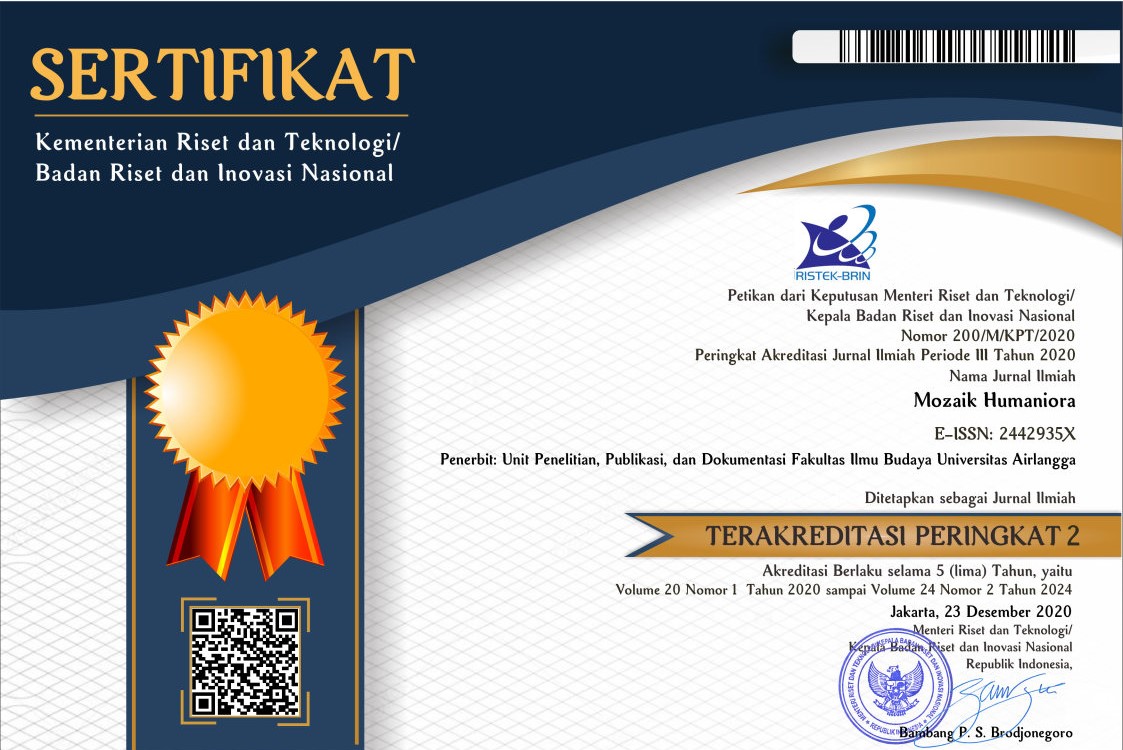The Relationship between Chinese Men and Indigenous Women in Gowok (1929): Postcolonial Feminist Studies
Downloads
This study aims to analyse how a Chinese-Indonesia descent male author represented indigenous women in Novel Gowok (1929). Gowok is a novel written by Liem Khing Hoo, depicting a relationship of race and gender under colonial discourse. To pursue the aim of this study, postcolonial feminist approach was used to reveal the quality of ideological and political relation under colonial discourse. The data collected were focussed on the relationship of women and race in this novel, the social group consciousness of the author, and colonial discourse. The results showed two points. First, the narrative of the indigenous women in this novel reflected the voice of Chinese-Indonesia descents from the moderate social group based on racial and gender relation. Second, the relationship of the indigenous women and the Chinese-Indonesia descents could be considered as political and ideological relation to realize tradition or culture nationalism concept in colonial contexts. In conclusion, this concept brings ambiguity characters.
Barlet, A. & M. Henderson. 2016. "What is a Feminist Object? Feminist Material Culture and the Making of the Activist Object." Journal of Australian Studies 40 (02), 156–171. DOI: 10.1080/14443058.2016.1157701.
Bhabha, H.K. 1994. The Location of Culture. London & New York: Routledge.
Faruk. 2007. Belenggu Pasca-Kolonial, Hegemoni dan Resistensi dalam Sastra Indonesia. Yogyakarta: Pustaka Pelajar.
Gandhi, L. 1998. Postcolonial Theory. Edinburgh: Edinburgh University Press Ltd.
Hoo, L.K. 1929. Gowok. Soerabaia (Surabaya): Tjerita Roman.
Idris, N. 2010. "Kedudukan Politik Perempuan dalam Metafora Masyarakat Minangkabau." Lingua Jurnal Ilmu Bahasa Dan Sastra 5 (2), 119–127. DOI: 10.18860/ling.v5i2.623
Ilma, A.A. 2016. "Representasi Penindasan Ganda dalam Novel Mirah Dari Banda; Perspektif Feminisme Poskolonial." Poetika, Jurnal Ilmu Sastra 4 (1), 3–11. DOI: 10.22146/poetika.v4i1.13310.
Lewis, R. & S. Mills. 2003. Feminist Postcolonial Theory: A Reader, disunting oleh R. Lewis & S. Mills. Edinburgh: Edinburgh University Press Ltd.
Mills, S. 1993. "Gender and Colonial Space." Gender, Place, and Culture 3 (2), 125–148. DOI: 10.1080/09663699650021855.
Minh Ha, T.T. 1996. "Women, Native, Other: Writing Postcoloniality and Feminism." Dalam Feminist Literary Theory: A Reader, disunting oleh M. Eagleton. Oxford: Blackwell Publishers.
Moleong, L.J. 2007. Metodologi Penelitian Kualitatif. Bandung: Remaja Rosdakarya.
Parashar, S. 2016. "Feminism and Postcolonialism: (En)gendering Encounters." Postcolonial Studies, 19 (4), 371–377. DOI: 10.1080/13688790.2016.1317388.
Salmon, C. 1981. Literature in Malay by the Chinese of Indonesia: a Provisional Annotated Bibliography. Paris: Editions de la Masion des Sciences de l'Homme.
________. 1996. "Masyarakat Bumiputera Indonesia di Mata Penulis Keturunan Tionghoa (1920-1941)." Dalam Sastra Peranakan Tionghoa Indonesia, disunting oleh L. Suryadinata. Jakarta: Grasindo.
________. 2005. "Confucianists and Revolution in Surabaya (c. 1880-c. 1906)." Dalam Chinese Indonesians Remembering Distorting, Forgetting, disunting oleh T. Lindsey & H. Pausacker. Singapore: Institute of Southesat Asian Studies.
Saputra, A.D. 2011. "Perempuan Subaltern dalam Karya Sastra Indonesia Poskolonial." Literasi 1 (1), 16–30.
Schwarz, H. & S. Ray. 2005. A Companion to Poscolonial Studies. Oxford: Blackwell Publishing Ltd.
Suryadinata, L. 1988. Kebudayaan Minoritas Tionghoa di Indonesia. Jakarta: Gramedia.
Susanto, D. 2017a. "Chinese Society as Depicted in Early Twentieth Century Chinese-Malay Literature. Wacana, Journal of the Humanities of Indonesia 18 (1), 256–265. DOI: 10.17510/wacana.v18i1.580.
________. 2017b. "Subjek Peranakan Tionghoa yang Ambigu dalam Drama Karina-Adinda (1913) Karya Lauw Giok Lan." Jurnal Pendidikan Bahasa dan Sastra 10 (2), 151–164. DOI: 10.17509/bs_jpbsp.v17i2.9654.
________. 2019. "Narasi Identitas Subjek Perempuan dalam Gadis Kolot (1939) Karya Soei Lie Piet: Kajian Kritik Sastra Feminis Pascakolonial." Mozaik Humaniora 9 (2), 160–171. DOI: 10.20473/mozaik.v19i2.13890.
Susilo, D. & A. Kodir. 2016. "Politik Tubuh Perempuan: Bumi, Kuasa, dan Perlawanan." Jurnal Politik 11 (2), 317–330. DOI: 10.7454/jp.v1i2.19.
Talpade-Mohanty, C. 1994. "Under Westren Eyes: Feminist Scholarship and Colonial Discourse." Dalam Colonial Discourse and Postcolonial Theory: A Reader, disunting oleh P. Williams & L. Chrisman. New York: Columbia University Press.
Young, R.J. 2003. Postcolonialism: A Very Short Introduction. New York: Oxford University Press.
Copyright (c) 2023 Dwi Susanto

This work is licensed under a Creative Commons Attribution-ShareAlike 4.0 International License.

Mozaik Humaniora is licensed under a Creative Commons Attribution-ShareAlike 4.0 International License. Both authors and Mozaik Humaniora agree with the following attribution of journal:
1. Copyright of this journal is possession of Author, by the knowledge of the Editorial Board and Journal Manager, while the moral right of the publication belongs to the author.
2. The journal allows the author(s) to retain publishing rights without restrictions
3. The legal formal aspect of journal publication accessibility refers to Creative Commons Attribution Share-Alike (CC BY-SA).
4. The Creative Commons Attribution Share-Alike (CC BY-SA) license allows re-distribution and re-use of a licensed work on the conditions that the creator is appropriately credited and that any derivative work is made available under "the same, similar or a compatible license”. Other than the conditions mentioned above, the editorial board is not responsible for copyright violation.


















